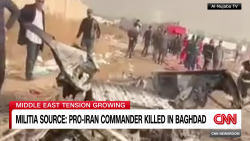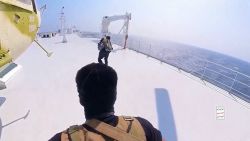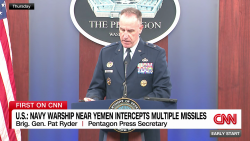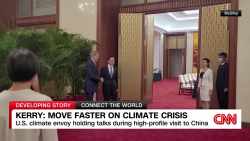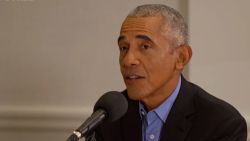Story highlights
NEW: Iranian official thinks start of missile deliveries will occur before end of year, state media reports
Russia says progress in nuclear talks means embargo no longer needed
"We don't believe it's constructive at this time for Russia to move forward with this," U.S. says
Russia has lifted a ban on the sale of a sophisticated air-defense system to Iran, drawing criticism from the United States and Israel.
“The big concern in the West … and especially in Israel is that these Russian missiles will be able to help shield Iran’s nuclear facilities from any future airstrikes,” said CNN senior international correspondent Matthew Chance.
Russian Foreign Minister Sergey Lavrov said the move Monday to end the ban on shipping the S-300 anti-aircraft missile system to Iran was prompted by the recent progress in talks over Tehran’s nuclear program. The ban had been in place since 2010.
“We are convinced that at this stage, there’s no more need of such an embargo, Russia’s separate voluntary embargo,” Lavrov said, according to the Russian news agency Tass.
The decision was also applauded by Iranian Foreign Minister Javad Zarif, who called the move “a step in the right direction.”
“We are looking to ever expanding our relationship with our neighbors, as well as with the rest of the world,” Zarif said in Madrid, alongside his Spanish counterpart. “But Russia is an important neighbor for us, an important partner.”
Another Iranian official, Secretary of the Supreme National Security Council Ali Shamkhani, said his country will receive delivery of the air-defense system by the end of the year, Iranian state media reported.
U.S.: Russian move isn’t ‘constructive’
U.S. officials were unimpressed.
“We don’t believe it’s constructive at this time for Russia to move forward with this,” State Department spokeswoman Marie Harf said at a news conference.
Secretary of State John Kerry raised the U.S. government’s concerns over the sale in a phone call with Lavrov on Monday, Harf said.
But shipment of the weapons system could begin at any moment after Russian President Vladimir Putin signed a decree Monday lifting the ban, presidential spokesman Dmitry Peskov said, according to Tass.
“The decree stipulates … no delays,” Peskov said, adding that it states that “it comes into force on the day it was signed.”
Israeli concerns
The Israeli government, which opposes the preliminary agreement that was reached on Iran’s nuclear program earlier this month, said the Russian move was a troubling sign.
“Even as Iran disavows article after article in the framework agreement that was announced last week, the international community is beginning to ease restrictions on it,” Intelligence Minister Yuval Steinitz said in a statement. “This is the direct result of the legitimacy that Iran is receiving from the nuclear deal being made with it.”
Lavrov insisted that the S-300 missile system “is of a purely defensive nature.”
“It is not designed for attacks and will not put at risk the security of any regional state, including Israel, of course,” he said, according to Tass.
But Steinitz offered a different interpretation.
“Instead of demanding that Iran desist from the terrorist activity that it is carrying out in the Middle East and throughout the world, it is being allowed to arm itself with advanced weapons that will only increase its aggression,” he said.
Tensions over nuclear talks
The framework agreement on Iran’s nuclear program announced earlier this month after lengthy negotiations between Tehran and world powers was considered a breakthrough by many observers.
But it faces stiff opposition from some quarters, including Israel and members of the U.S. Congress.
Negotiators also have to reach a comprehensive deal by the end of June, with uncertainty still clouding several key issues such as the pace at which sanctions on Iran would be lifted.
U.S. officials have said that military force remains an option to prevent Iran from developing nuclear weapons but that the aim is to achieve the goal through negotiations.
“We have the capability to shut down, set back and destroy the Iranian nuclear program and I believe the Iranians know that and understand that,” Defense Secretary Ashton Carter told CNN last week.
It’s unclear to what extent the sale of the S-300 missile system to Iran would affect the U.S. capability – or that of other nations like Israel – to strike Tehran’s nuclear facilities.
Shipment not seen breaching U.N. sanctions
Harf said Russia’s lifting of the ban on the sale shouldn’t create divisions in world powers’ efforts to reach a final deal with Iran.
“We don’t think this will have an impact on unity in terms of inside the negotiating room,” she said.
The countries negotiating with Iran are the five permanent members of the U.N. Security Council – China, France, Russia, the United Kingdom and the United States – plus Germany.
Harf also said the United States doesn’t believe the shipment of the Russian missile system to Iran would violate any U.N. Security Council sanctions.
Iran, meanwhile, welcomed Moscow’s announcement.
“The expansion of cooperation [with Russia] and improving cooperation with other neighboring countries in various fields can be very effective in establishing sustainable stability and security in the region,” Defense Minister Brig. Gen. Hossein Dehqan said, according to Iran’s Islamic Republic News Agency.
CNN’s Salma Abdelaziz, Elwyn Lopez, Alla Eschchenko, Emma Burrows, Greg Botelho, Oren Lirbermann and Jennifer Deaton contributed to this report.




